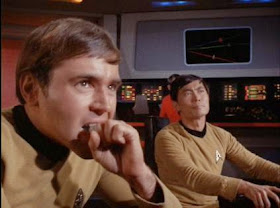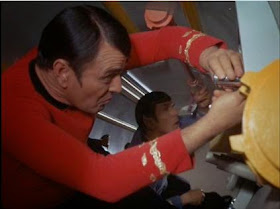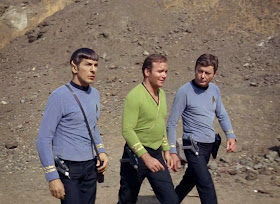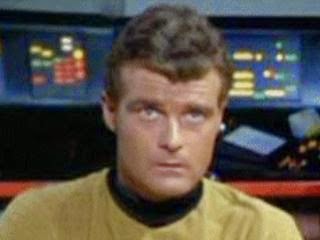“The Ultimate Computer”
Air Date: March 8, 1968
Mom Title: “Captain Dunsel”
Finally,
both Sulu and Chekov are back. Being known as “those two guys” driving the ship
speaks volumes for their chemistry, since they were both there at the same time
so infrequently.
Their
mentor/career choices are fairly obvious. Sulu takes orders from Kirk, Chekov
from Spock. They were the real “Next Generation” in another fantastic bottle
episode, allowing us to see all kinds of cool crew moments.
That
crew is reduced to twenty due to the M-5 computer. Amazingly a visible
percentage of them are Redshirts. It would seem dying unnecessarily is a key
need on a starship. That may also
explain why Kirk and Bones are listed as non-essential personnel for the
landing party, considering how many times each of them has single handedly or
in combination saved the lives of the entire away team.
The
Big Three bicker constantly, but form up when something important to one is
threatened, in this case: Kirk’s command and confidence. Jim worries if he’s being nervous and petty,
but Bones does his job, pointing out the fact that asking means he’s not.
Spock’s support is more subtle but just as powerful. He fully admits efficient isn’t always better
when defining the importance of the command role. His statement, “A starship
also runs on loyalty to one man, and nothing can replace it or him,” contains
both logic and an understanding of emotion. His actions follow that up. Even
though the M-5 is “in command,” when the Captain leaves the bridge Spock
immediately sits in his chair.
In
a sense, the whole episode is a test of Kirk’s idea, “There are things men must
do to remain men.”
Was
it some kind of cruel trick that the Enterprise was selected for this
test? Nothing sets off Kirk more on his
missions, which have no doubt been documented and reviewed, than a computer
controlled society, or an outside force taking over his ship. This training exercise gave him a heavy dose
of both.
I
believe the answer comes from Commodore Bob Wesley. Not because the commander of the USS
Lexington is a butthead, or insane like every other high level official we’ve
met. Wesley is a rare example of another
highly competent and awesome starship commander.
He’s
smart and compassionate enough to not blow up the Enterprise up out of spite.
He’s
close enough to the Captain to call him “Jim.”
He’s
cool enough to have his own groovy custom command chair.
Considering
it only takes about five minutes talking to Doctor Daystrom to realize the man
oozes crazy (besides that fact that he’s a vampire and a pirate),
it wasn’t much of a stretch to deduce his perfect thinking machine would turn out to be based on him, and a dangerous megalomaniacal organicophobe. (Basically, Ultron.)
it wasn’t much of a stretch to deduce his perfect thinking machine would turn out to be based on him, and a dangerous megalomaniacal organicophobe. (Basically, Ultron.)
The
Commodore must have chosen Kirk specifically, knowing no one proclaims, “Pull
the plug!” with such emphasis and panache.
With
lives at stake and technical issues at the heart of the matter, the Big Three
upgrade to the Big Four, with the Chief Engineer joining in.
Spock and Scotty attack the hardware while McCoy goes straight to Daystrom’s psych files.
Great idea Bones, might have wanted to do that before turning over the control of a craft that can vaporize a civilization from orbit, but better late than never.
Spock and Scotty attack the hardware while McCoy goes straight to Daystrom’s psych files.
Great idea Bones, might have wanted to do that before turning over the control of a craft that can vaporize a civilization from orbit, but better late than never.
Captain
Kirk goes directly to the M-5 and its creator, for some spectacular
Shakespearean actor drama wars between Shatner and William Marshal. The overselling may be where the death
penalty for murder idea came from. After
all, it was stated the only Federation death sentence is General Order Seven,
and I’m pretty sure the M-5 hasn’t been to Talos. (Unless, he added to grow his
own conspiracy, they secretly guided its development.)
Highlights
of great Big Three moments.
Spock
revisits his usage of interesting versus fascinating, likely to annoy
Bones. While he lets the Doctor
monopolize the hysterics when the M-5 goes loopy, Spock is still the first one
to the Captain’s side when it knocks Kirk down.
McCoy
lends his emotional support and bartending skills to the Captain, but as soon
as the engrams hit the fan, he ditches his drink as he runs back to work.
Leadership
lessons from Captain James T. Kirk: He
fully comprehends that achieving, “Today I will be brilliant,” is impossible. This
doesn’t keep him from demanding it from his crew in times of crisis, and
providing guidance to help them achieve it.
He also knows famous scientists of the past and his present, as well as
quotes from 20th century poetry, because he’s awesome.
Final
personal log on Wesley’s “Captain Dunsel” barb.
I’m
sure Bob did it to make sure Jim was totally focused on finding any possible
flaw with the M-5 by building resentment, but it was harsh.
The
line gives Sulu and Chekov a fantastic moment of non-verbal communication as
they react with offense to what their commander has been called. Even Spock’s stoic outer shell slips a little
when the Vulcan equivalent of, “OH NO he di-in’t!” passes across his face.
Ah,
the laughs we would have at each other’s expense playing Starfleet Battles,
marking a friend’s egregious tactical error (such as my penchant for blowing a
high energy turn, sending my command ship spinning through an asteroid field) with
taunts of “Captain Dunsel” for the remainder of the afternoon.
Man,
we were such geeks.
Actually,
we probably still are such geeks.
But
geeks who lack the time to spend hours on end pushing cardboard space ships
across black hex paper while carefully plotting the next phase of our space navy’s
assault.
I’m
kinda sad about that now.
“Bread and Circuses”
Air Date: March 15, 1968
Mom Title: “Space Romans”
Sulu’s
gone once more, as they clump “people less worthy than Kirk violating the Prime
Directive” based stories. This time,
Captain Merik washed out of the academy, making him even worse than the
Starfleet screw ups we’ve seen before.
Here’s a question: if Merik joined the Merchant Marines, why was the
Beagle doing a survey? Considering the
Enterprise is the “only ship in the area” ninety-five percent of the time,
Starfleet must be conscripting civilian ships for some of its lower end tasks.
The
Enterprise crew beams down to one more in a seemingly endless string of Earth
equivalents. This one is explained away
by Hodgkin’s Law of Planetary Planet Development. No wonder they were captured
at the Batcave. This law also explains why the folks on planet 892-IV speak
English, just like they did in the real Roman Empire…or something. This is in
contrast to all of the other planets that seemed to contain English speakers,
but were actually filtered through the universal translator, which somehow has
more and complex powers than the TARDIS telepathic circuits
This
culture is clearly morally bankrupt if not fully stagnant. It features slavery and gross violations
against human rights. For some reason,
Captain Kirk picks this location to suddenly become a giant fan of the Prime
Directive.
(Even though they beam down in full uniform, oopsie.)
(Even though they beam down in full uniform, oopsie.)
Is
it because Marcus Claudius is clever, commanding and confident, granting him
protection in the “guy like Kirk” category?
(He’s
far from perfect though.
“Let
us kill your entire crew, or we’ll kill these two members of your crew.”
Maybe
it’s time for a night class in “How to threaten,” or at least basic set
theory.)
Is
it because the “slaves” have medical benefits and a pension?
(And
wouldn’t that be “a job”?
Put
one of them in a cubicle, and it’s more or less what I do.)
No,
I think there is a crystal clear and basic reason why Jim refuses to disrupt
this society.
When
love slave Drusilla convinces Kirk she’s his “gift’ with the phrase, “Command
me,” he does a take that puts his gaze directly at the viewer. The expression
on his face has one overwhelming meaning,
“You're
a Roman, Kirk, or you should have been.”
We
may not learn James T. Kirk’s middle name is Tiberius until the Animated
Series, but here is where we learn why it’s a perfect choice.
As
usual, the hallmark of the quality episodes is the character interactions.
We
learn of an upgrade in the security protocols. Condition Green means, “We’re
screwed but don’t do anything.” Is there
a whole rainbow of “conditions” to cover wide scenarios using tactics they’ve
demonstrated before?
“Condition
Maroon – Beam up everyone in the room, and keep non crew members in the
buffer.”
“Condition
Burnt Umber – use the ship’s phasers to stun a four city block area.”
“Condition
Brown – We’re hopelessly outnumbered, send down some extra underwear.”
Kirk
doesn’t need a whole system, because he trusts Scotty to work out how to do
something on his own, which he does expertly.
He must have gotten help from Uhura monitoring the planet’s broadcasts
to tell him the key moment to arrange the blackout.
Spock
and Bones start out on the cranky side. This ratchets up considerably when
McCoy is in danger of being filleted in the games, producing one of his most
entertaining tirades.
Things cool off once Spock rescues him, but both of their concern for the Captain (who ironically is busy being Drusillaed at that time) brings it back to a fever pitch.
Things cool off once Spock rescues him, but both of their concern for the Captain (who ironically is busy being Drusillaed at that time) brings it back to a fever pitch.
Kelley’s
impassioned rant against the Vulcan’s lack of emotions is completely in
character and based on the concern, compassion and friendship that are the core
of the Doctor.
Nimoy also remains in character, proving once again that Spock controls his emotions, and only pretends not to have them to annoy Bones. His “Really, Doctor?” contains as many feelings as McCoy’s entire explosion.
Nimoy also remains in character, proving once again that Spock controls his emotions, and only pretends not to have them to annoy Bones. His “Really, Doctor?” contains as many feelings as McCoy’s entire explosion.
Other
moments are now expected. Kirk forgets he has a gun again, being far too
excited at the sword based society he’s found.
While
the Captain and Mr. Spock work on the bridge, the rest of the crew stops in awe
to watch, similar to how the Muppet performers venerated Jim Henson and Frank
Oz. (There’s an analogy you’ll never see on the SATs)
Uhura
gets a starring role in the final scene. We learn the importance of having a
woman in the command crew. While all the men are busy running around, fighting
and Drusillaing, the Communications Officer is the only one really paying
attention to what’s going on.
Everyone
is puzzled because at the idea of Sun worshipers in Ancient Rome, because this
ship load of historians seems to have all been absent the day they covered
Egypt.
Uhura’s
the only one who figures out it’s “the son of God,” which Spock and McCoy both refer to as “
philosophy of total love and total brotherhood.” The threat of cancellation was great enough
at this point that Trek stopped attacking religion to take jabs at television
network practices.
Kirk’s
thoughts on having both Caesar and Christ, “Wouldn't it be something to watch,
to be a part of? To see it happen all over again?” is a clear cover to come
back to his little Drusilla furnished retirement cottage.
Those
automatic weapon fueled crusades are going to be messy, though, aren’t they?
Final
thought: We get an extremely rare sighting of one of Kirk’s bluffs not working. I guess he was a little too
overconfident. A good rule of thumb -
don’t assume the jail break is successful until you’re outside of the cell.
Luckily
Captain Merik decided to help him, after being subjected to what may be the
most emasculating insult in the history of television:
“Assignment: Earth”
Air Date: March 29, 1968
Mom Title: “Gary Seven”
The
season ends with both Chekov and Sulu, working smoothly together, even at other
stations.
This
failed pilot is the closest the world will ever see to Classic Star Trek meeting Doctor Who.
Gary
Seven has a ditzy companion he lets get kidnapped,
a sonic “pen”, advanced knowledge of time and space, a concealed teleportation machine, and superior physical abilities and resistances. Basically, it’s a Third Doctor episode with Star Trek music.
a sonic “pen”, advanced knowledge of time and space, a concealed teleportation machine, and superior physical abilities and resistances. Basically, it’s a Third Doctor episode with Star Trek music.
Note
to the network, if you’re planning a pilot, hiring an actor like Robert Lansing
who contractually refuses to do a series might be a poor choice.
It’s
the Enterprise, not the Doctor stand-in, that travels in time – on a mission
for the Federation no less. Hey, what
could happen? All that occurred on
the two accidental time travels they had was a key member of earth’s space
program was almost erased from existence, and the Nazis’ almost won World War
II. This makes the biological and security safety protocols of the Federation
look amazingly competent by comparison.
We
learn the Andromedan’s invasion has been influencing earth for a while. Mr. Seven has a super intelligent computer
and travels to Earth via and intergalactic transporter, from a place where
aliens have captured and bred humans to have perfect human bodies, like the
Kelvans, for missions. I’m not really
sure why any of that prevents the Vulcan neck pinch from working, maybe it’s a
side effect of the sonic pen?
Isis
appears to be the same kind of feline shape shifter as Sylvia from "Catspaw." That means either Sylvia was a
deliberate test for Korob/Charlie…or something far more sinister. These extra galactic beings keep trying to
steal the Enterprise or some other ship. Much like Doctor Who’s Silence, it seems the Andromedans were influencing the
human race all along to insure that space travel was developed, in order for
them to usurp the technology in the future.
That would fit under the line they fed Gary, that their goal is to
protect lesser cultures. They just left out the part that they’re protecting
them for their own purposes, as they continue to train and test humans to guide
them in a certain direction.
Three
character connection notes:
1) We see Lieutenant Leslie tempting fate in his
usual red shirt immediately after seeing him in another part of the ship in
gold. I think we’ve found the explanation for his surviving the vampire cloud. There’s a batch of Leslie clones serving on
the Enterprise!
2)
Finnegan, Kirk’s academy tormentor, had an ancestor who was Irish policeman in
the late sixties. Lieutenant Hadley also
had an ancestor at that time working at McKinley Rocket Base. Hmmm…Billy
Blackburn also played one of Mudd’s Androids, the android body Sargon and company were creating and multiple other roles. Perhaps he and the Leslie series are
robotic spies from Andromeda!!!!
3)
Her portrayal as Roberta Lincoln dispels any doubt whatsoever that Terri Garr
was the perfect choice to play Phoebe’s mom on Friends.
The
boys in their nifty disguises react to Ms. Lincoln exactly as one would
expect. Captain Kirk’s initial instinct
is to completely trust the blonde in the miniskirt…but he needs to get the OK
from Spock to approve acting in a non-logical manner.
And
so, the season that defined all that is great about Star Trek comes to a close.
Click to Continue
Click to Continue






























No comments:
Post a Comment